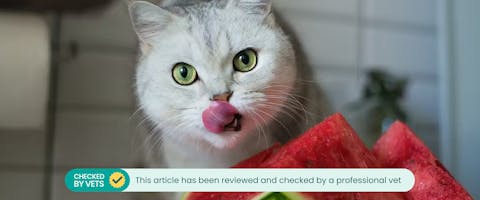Updated 12/05/2023
There’s nothing quite as refreshing as a nice bit of melon on a warm summer’s day - better still, this tasty snack can even help us hit our five-a-day goals. But what about our feline friends... can cats have melon, or is melon bad for cats?
It’s a good question - one every pet parent should know the answer to. Let’s take a closer look at our feline friends and their relationship with this tasty summery fruit...
Trending posts
Purr-use some of the top blogs our members have been loving this month- Top male dog names for your new furry friendGot a new furry family member in your pack? Check…

- Top female dog names for your new fluffy palWelcoming a new pooch into your family? Explore…

- 250+ gray cat names your silver feline will loveRecently welcomed a fluffy gray bundle of joy into…

- What are normal pet sitting rates?Discover the average pet sitting rates for animals…

- Unique dog names to stand out from the packDare to be different with our list of the best…

Is melon safe for cats?
So, can cats eat melons? The short answer is yes, they can. Melons - including cantaloupe and watermelon - are non-toxic and therefore safe for your feline friend to consume. Just be sure to stick to the flesh of the fruit, and avoid giving your kitty the seeds (which contain small amounts of cyanide) or the rind, as these can pose a choking hazard or cause your kitty some tummy upset. Cyanide causes the cells in your cat’s body to stop taking in adequate amounts of oxygen which is very damaging.
Is melon good for cats?
Melon is full of fiber, water, vitamins, and nutrients, and so, can be a healthy addition to your kitty’s diet. That said, cats are hardcore carnivores who get their nutritional needs met from a meat-based diet - and so, fruits and veggies will do very little for our feline friends, nutritionally speaking.
Like most fruits, melon is also high in sugar, and can lead to weight gain in cats. So, it’s best to keep your kitty’s melon munching at a minimum.
Feeding your cat melon
While melon is unlikely to do your kitty any harm, it’s unlikely to do them much good, either! Your kitty should be getting everything they need from a high-quality, meat-based diet - and so, feeding them fruits isn’t really necessary.
That said, if you’d like to feed your kitty a piece of melon as an occasional treat, be sure to cut it into small, bite-size pieces, and remove the rind and any seeds.
Melon is high in fiber, and too much can lead to tummy upset - particularly if your kitty has a sensitive stomach. Likewise, cats with weight problems or diabetes should avoid eating melon.
It’s a good idea to introduce new tastes into your cat’s diet gradually, and keep an eye on them afterwards for any ill effects. While melon allergies in cats are rare, there’s always a small chance your kitty may not react well to a new food.
Meet our veterinary expert, Emma
This article has been checked by veterinarian Emma Chandley, BVetMed MRCVS PGCertSAS. Emma graduated from the Royal Vet College in London in 2011. She has a keen interest in surgery and went on to do a postgraduate certificate in small animal surgery and was then awarded advanced practitioner status in the same discipline.
What other foods are safe for cats?
In short: can cats eat melon? Yes, but only in moderation! While we pet parents are often aware of the foods that are definitely bad for cats (chocolate, coffee - you get the picture), there are a few ‘human’ foods that can be safe for our feline friends to eat, including:
- Pumpkins (remove the outer skin and seeds)
- Pears (remove the seeds, the stem and skin)
- Oatmeal
- Cooked eggs
- Cooked meat (without any seasoning)
- Brown rice
- Broccoli
It always pays to know what is and isn’t safe for cats to eat. But if in doubt, always go without (and anyway, we think kitty would much prefer their meaty kibble…)

